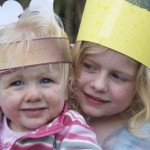Let the children play, it’s good for them
I read this fascinating article by Alison Gopnik on Smithsonian.com and I wanted to share the main thrust of it because I think it reiterates the importance of play.
“Walk into any preschool and you’ll find toddling superheroes battling imaginary monsters. We take it for granted that young children play and, especially, pretend. Why do they spend so much time in fantasy worlds?
“People have suspected that play helps children learn, but until recently there was little research that showed this or explained why it might be true. In my lab at the University of California at Berkeley, we’ve been trying to explain how very young children can learn so much so quickly, and we’ve developed a new scientific approach to children’s learning.
“Where does pretending come in? It relates to what philosophers call “counterfactual” thinking, like Einstein wondering what would happen if a train went at the speed of light.
“We found children who were better at pretending could reason better about counterfactuals—they were better at thinking about different possibilities. And thinking about possibilities plays a crucial role in the latest understanding about how children learn. The idea is that children at play are like pint-sized scientists testing theories. They imagine ways the world could work and predict the pattern of data that would follow if their theories were true, and then compare that pattern with the pattern they actually see. Even toddlers turn out to be smarter than we would have thought if we ask them the right questions in the right way.
“Play is under pressure right now, as parents and policymakers try to make preschools more like schools. But pretend play is not only important for kids; it’s a crucial part of what makes all humans so smart.”
For me, the article is summed up by the sentiment:
Play is a crucial part of what makes all humans so smart
Read more: http://www.smithsonianmag.com/science-nature/Let-the-Children-Play-Its-Good-for-Them.html
